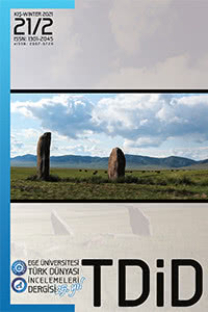DİLBİLİMSEL KURAMLAR VE İDEOLOJİ
İnsanı, olayları, olguları, evreni dil ile anlamlandırırız. Anlam vermek demek, bir dili, bir göstergeyi çözümlemek demektir. Dil aynı zamanda, bir iktidar aracıdır. Dil ile ideoloji iç içe işler. Dil ve ideoloji gerçeği maskeleyebilir ya da açıklayabilir. İdeolojiler bir bakıma insanların gördükleri düşlerdir, yaptıkları gözlemlerdir; insanların kendi beyin ve gönül süzgecinden geçirdikleri, ‘gerçek’ diye öne sürdükleri varsayımlardır. Dilbilimsel kuramlar da bir ideolojiyi içinde barındırır ve tarihin akışından kopuk değildir. Her söylemde, öznenin ideolojik, kişisel izleri vardır. Sağlıklı bir iletişim için yapılması gereken, dildeki bu ideolojiyi görmek, ötekinin söylemini doğru bir şekilde anlama/anlamlandırma çabası göstermektir. Bu yazıda dil ile insan bilimleri; dilbilim, dilbilimsel akımlar ile ideoloji arasındaki ilişki ve anlamlandırma üzerinde durulacaktır
Anahtar Kelimeler:
Dil, söylem, İdeoloji, Dilbilimsel Kuramlar
Linguistic Theories and Ideologies
We signify the man, the events and universe through language. Signification is to make analyses of a sign, a language. Language is by the way a means of power. Language and ideology may either disguise or explain the reality. Ideologies in a sense are the dreams that people have; as suppositions that are pronounced as ‘reality’ as a result of an arduous and heartily work of mind. Linguistic theories consist of an ideology and are not free from the flux of history. It is possible to see in every discourse the ideological personal traces of the subject. What is needed to achieve a healthy communication is to discern the very ideology in language and spare an effort to understand/signify the discourse of the very other in the best possible way. In this work, points such as language and humanistics, the relationship among linguistics, linguistic approaches and ideology will be studied as well as signification
Keywords:
Language, Discourse, Ideology, Linguistic Theories,
- ISSN: 1301-2045
- Başlangıç: 1996
- Yayıncı: Ege Üniversitesi Türk Dünyası Araştırmaları Enstitüsü
Sayıdaki Diğer Makaleler
DİLBİLİMSEL KURAMLAR VE İDEOLOJİ
IRAK TÜRKMEN ŞAİRLERİNDEN HASAN GÖREM
Muhsin KEVSER, Mehmet TEMİZKAN
DEDE KORKUT KİTABI BAĞLAMINDA GÖÇ ROMANI ÜZERİNDE BİR DEĞERLENDİRME
AZERBAYCANLILARIN ANADOLU TÜRKLERINE KARDEŞLIK YARDIMLARI(BALKAN VE I. DÜNYA SAVAŞI ESNASINDA)
TÜRKİYƏDƏ VƏ AZƏRBAYCANDA XALQ MAHNILARININ TOPLANMASINA DAİR
İKİNCİ MEŞRUTİYETİN İLK YILLARINDA SÜRGÜN VE FİRARİLER SORUNU VE FEDAKARAN-I MİLLET CEMİYETİ
DİNLER COĞRAFYASI IŞIĞINDA BULGARİSTAN’DAKİ DİNSEL TOPLULUKLAR
TÜRK HALK EDEBİYATINDA ANLATIM ARACI OLARAK ELMANIN KULLANIMINA ONTOLOJİK BİR YAKLAŞIM
